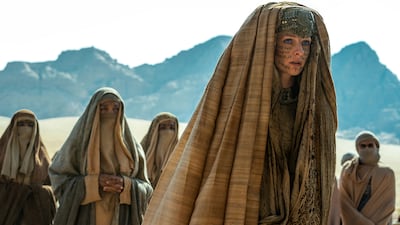A science fiction epic should linger in the mind in monolithic splendour. The problem is, most of them don't.
Thankfully, there is zero chance whatsoever of Dune: Part Two tumbling out of our memories and ending up at the bottom of the bargain bin.
It is a healthy antidote to the widespread jadedness of contemporary blockbusters – a film that reinstates the marvel of the epic on the big screen. Its story is sharp. Its struggles are reflective of the modern age. Its writing is precise. Its aesthetic is idiosyncratic. Its score is stirring. Its performances inflict the full gamut of human emotion.
Of course, making a memorable film in any genre is never easy. But making all the small parts click together gets even trickier in the sci-fi realm, where one crack in the structure can bring the whole edifice down and cause it all to blur together in one's mind into a cliched slurry. This stunning sequel accomplishes it with a deft touch.
What separates an unforgettable sci-fi epic from a lacklustre one is how seamlessly all its disparate layers come together – how holistic the world-building seems in the end.
Complicated worlds work best when they feel simple. With films that are adapted from doorstopper bestsellers, and with source material as dense as Dune’s, the challenge of cohesion often proves insurmountable.
It makes sense, then, why the 1965 novel by Frank Herbert had become something of a white whale among filmmakers. Alejandro Jodorowsky had an unsuccessful attempt at adapting the work, and David Lynch would go on to distance himself from his own 1984 interpretation. For a long while, it seemed that Arrakis was impossible to render faithfully on screen. Then in 2021, Denis Villeneuve released Dune.
In a cinema culture saturated with grandeur, it is understandable that we’ve become somewhat jaded by blockbusters. Between the constant barrage of films and series tackling superheroes, the fantastical and the dystopic, we have become an audience that is inured to spectacle.
Villeneuve’s first Dune film somehow managed to not only do its source material justice but stood as its own as a cinematic masterpiece. Between sprawling, desert scenes honed by refracting light and fog, to the glum-lit and tense instances that feature the Harkonnen, the film was confident in its visual juxtapositions and aesthetics.

Its stellar cast, which featured Timothee Chalamet, Zendaya, Josh Brolin, Rebecca Ferguson, Oscar Isaac, Dave Bautista and Javier Bardem, also delivered top-notch performances, and for many of them the portrayals would be career-defining.
The film marked Hans Zimmer’s best score in years, with otherworldly orchestral and vocal compositions that stir as they border on the eerie, and won six Oscars.
However, as much as Dune met acclaim in awards season, there was ambivalence on how to view the film. It was, after all, not a complete film in itself, and seemed more like an introduction to the world of Dune than a fully fledged story. Those who hadn't read the original material also seemed suspicious of the white saviour trope that seemed to direct the film.
Dune: Part Two picks up where the first film trailed off, in both style and substance. The film starts with Paul Atreides (Chalamet) as he begins rallying the Fremen to retake Arrakis from the Harkonnens, who launched a bloody assault against the Atreides House for the planet’s control.

While the first film set firm the foundations for a geo-political scuffle, the second dives deep into these tensions, ramping up the pressure in all kinds of unexpected ways. Dune: Part Two is a delectable pay-off to the drama that was burrowed in the foundations of the saga.
Another thing that makes this instalment engrossing is the heterogeneity and individual quality of its characters. No faction or house is uniform in ideology; the Fremen are divided in how they respond to the prophecies proliferated on the planet by the mysterious sisterhood called the Bene Gesserit, which points to Paul being the chosen one, or Lisan al Gaib.
The Harkonnens as well as the Bene Gesserit have their own power struggles to contend with. Emperor Shaddam’s intergalactic rule, meanwhile, hangs in the balance, and his daughter, Princess Irulan (Florence Pugh) tries to find her own path to leadership while accounting for her father's oversights.
The film also brings several star players to the fold, from Christopher Walken, who portrays the emperor, to a surprise role by Anya Taylor-Joy, plus Austin Butler, who takes on the role of Feyd-Rautha, the Harkonnen foil to Chalamet’s character. Zendaya also is propelled to the forefront, playing Chani with a performance that is rife with complexity.

The dynamic between Chani and Paul, meanwhile, takes on the expected romantic turn before upending expectations with a tense climactic scene. The second film sets the stage for Paul’s continuing transformation as a leader, and even if you’ve read the book and know how the character eventually shapes up, it is a pleasure watching Chalamet struggle in the throes of destiny, prophesy and choice.
Overall, Dune: Part Two sustains and even elevates the aesthetics that made the first film great, proving its predecessor was an achievement in its own right. It is one of those films that reminds a person of their first experience at the cinema.
To me, it brings up memories of first watching Lord of the Rings: The Fellowship of the Ring, braving into the cinema with a forged passport copy that pretended I was old enough to watch the film. It is the cinematic epic of this generation.
When its time in the awards season comes, it won’t be surprising if Dune: Part Two collects its fair share of statuettes. The film has the makings of a contemporary classic, with the only downside being that we’ll have to wait another few years to see how tensions unfold.
Dune: Part Two releases in UAE and Lebanon on February 29, and is scheduled for a wider regional release on the April 11


